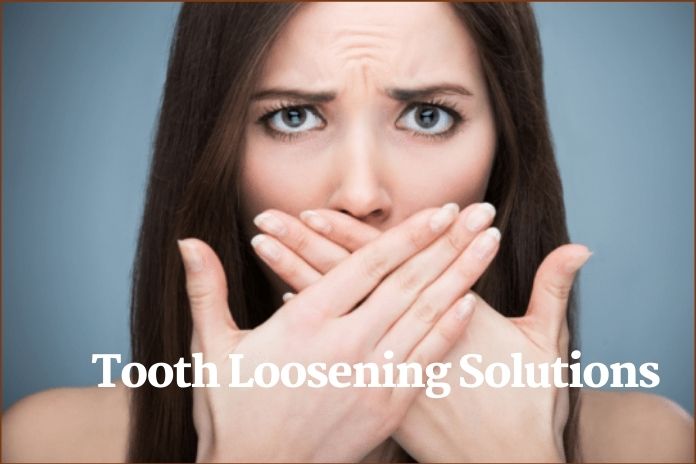The loosening of the teeth represents the final stage of inflammation of the gums, periodontitis. It can be avoided by better dental hygiene and regular scaling.
Why Do Teeth Come Loose?
The mouth naturally hosts a bacterial flora which, as long as it respects a certain balance, remains favorable to the health of the gums. However, sometimes this balance is upset, allowing pathogenic bacteria to gain the upper hand. They can then cause inflammation, which can lead to loosening of the teeth in the long term.
At the first stage of the disease, it is called gingivitis. “At first, the symptoms are not very marked, ” observes Dr. David Nisand, president of the French Society of Periodontology and Oral Implantology. The gums are red, swollen, hypersensitive, can bleed when brushing, and this can cause bad breath (halitosis). Pain associated with inflammation can appear in more advanced forms when an abscess has formed or teeth begin to move. “
Indeed, as the bacteria proliferate, they attach themselves to the teeth and gums, forming what is called “dental plaque.” This biofilm becomes more and more resistant to brushing over time. And an inflammatory process begins.
Gradually, bacteria penetrate between the tooth and the gum, forming a real pocket. Two major consequences: the gum retracts, and the inflammation slowly destroys the bone to which the tooth is attached. At this point, we are talking about periodontitis. This disease can have serious consequences. The tooth is no longer firmly held by the gum and the bone; it begins to move. She can even move around, even take off her shoes.
What Are The Causes Of Inflammation Of The Gums?
At the origin of the process, the imbalance of the oral flora can be caused by inadequate dental hygiene (ineffective brushing, neglected to descale).
What Are The Risk Factors?
In addition, certain factors may play a role in the course of the disease.
- Stress weakens the immune system, thus promoting the proliferation of bacteria.
- Tobacco also creates favorable conditions for the development of pathogenic bacteria. “In addition, patients who smoke tend to bleed less because of the reduced vascularization of the gums. Without this warning sign, patients tend to consult less, allowing the disease to develop more quickly,” adds the dentist.
- Diabetes promotes periodontal disease. It is estimated that 60% of people with diabetes suffer from gingivitis or periodontitis. In them, a periodontal assessment is recommended every three months by a dentist.
- Pregnancy is a risky period for the gums. Under hormonal variations, early gingivitis can worsen, especially between the third and sixth months. Do not hesitate to consult your dentist if you have the slightest doubt.
Can We Repair Loose Teeth?
In some cases, the tooth is not recoverable. An implant or a bridge can replace it. But be aware that patients who have been treated for periodontal disease have a higher risk of complications, as their gums and underlying bone are weakened.
To avoid this happening, certain treatments must be started early enough. At the stage of severe periodontitis (20% of cases), it is sometimes necessary to open the gum to eliminate deep pockets of bacteria. The operation is performed under local anesthesia, in the dentist’s office, in one or more sessions. Different techniques can also repair the tooth attachment system.
How To Reduce Inflammation Of The Gums?
In the case of periodontitis, subgingival scaling, called root planing, is necessary. It will eliminate the pockets of bacteria that have formed between the tooth and the gum. Result: the inflammation subsides. The gum will regain a normal appearance and tighten around the tooth. The dentist proceeds using ultrasound instruments and curettes. He finishes by polishing the teeth with a special paste to prevent bacteria from adhering too easily.
The act is performed in the dental office, under local anesthesia, in one or more sessions. This root planing is only covered by Social Security for people with diabetes, up to 100%, in the context of a long-term illness. Regular checks will then be carried out.
In general, it is advisable for everyone (regardless of the state of their gums) to perform preventive scaling once a year at their dentist. This is to remove dental plaque in areas where the toothbrush is not effective enough. This type of scaling is shallower than root planing. Local anesthesia is not necessary in most cases. Social Security reimburses this act up to 70%.
“These treatments are very effective, but they require regular and individualized monitoring according to the risk factors of each patient,” explains Dr. Nisand. In some people, an annual descaling and check-up are sufficient. Others need two or three sessions per year.
What Dental Hygiene To Avoid Loosening Of The Teeth?
The mechanical removal of dental plaque (brushing, brush, thread) is fundamental. By preventing the build-up of bacteria, the risk of developing gingival inflammation is considerably reduced, and therefore the longer-term risk of loosening of the teeth.
How Do You Brush Your Teeth Well?
It would help if you brushed your teeth at least twice a day, using a soft-bristled toothbrush ( manual or electric).
The most effective gesture: brush with a roller movement from the gum to the tooth, the brush’s bristles being placed at 45 °.
When choosing toothpaste, the only advice is to avoid whitening products that are too abrasive.
After each brushing, we insist on the interdental space:
In all cases, a dentist can explain the handling of these accessories and give individual advice.
Are Mouthwashes Helpful?
To calm inflamed gums, “chemical methods like antiseptic mouthwashes work, but the most important thing is to focus on mechanical removal of deposits,” says Dr. Nisand. The use of mouthwash is not recommended daily.
Also Check: Toothache: Grandmother’s Remedies To Relieve A Toothache

